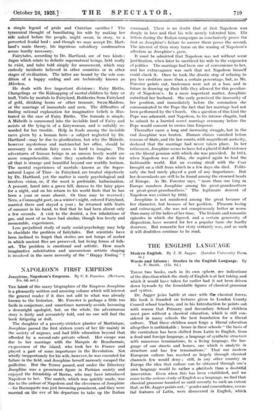NAPOLEON'S FIRST EMPRESS
THE latest of the many biographies of the Empress Josephine is a pleasantly written and amusing volume which will interest the general reader if it does not add to what was already known to the historian. Mr. Forester is perhaps a little too facile in conjecture, and sometimes narrowly avoids becoming a downright apologist, but, on the whole, the adventurous story is fairly and accurately told, and no one will find the book fatiguing or dull.
The daughter of a poverty-stricken planter of Martinique, Josephine passed the first sixteen years of her life mainly in the society of negroes, and had little education beyond that afforded by a second-rate private school. Her escape was due to her marriage with the Marquis de Beauharnais, ex-governor of the island, who took her to France and played a part of some importance in the Revolution. Not wholly inopportunely for his wife, however, he was executed for failure in the field, and Josephine herself narrowly escaped the guillotine. But the Terror passed, and under the Directory Joseplilne was- a prominent- figure in Parisian society and enjoyed the friendship of Barras, who may have introduced Napoleon to her. The match, which was quickly made, was due to the ardour of Napoleon and the cleverness of Josephine —for Buonaparte was just becoming prominent, and they were married on the eve of his departure to take up the Italian command. There is no doubt that at first Napoleon was deeply in love and that his wife merely tolerated him. His letters during the Italian campaigns as conclusively prove the first as Josephine's failure to answer them prove the second. The interest of their story turns on the waning of Napoleon's affection as Josephine's grew.
It must be admitted that Napoleon was not without some justification, when later he sacrificed his wife to the exigencies of polities. The marriage had been one of convenience to her, and her extravagance was such that not Napoleon himself could check it. Once he took the drastic step of refusing to pay her creditors more than a certain percentage, but, as Mr. Forester points out, tradesmen were not at a loss, and in future in drawing up their bills they allowed for this peculiar- ity of Napoleon's. In a more important matter, Josephine outwitted her husband. She early perceived the insecurity of her position, and immediately before the coronation she communicated to the Pope the fact that her marriage had not been performed by the Church. On a question of this kind the Pope was adamant, and Napoleon, to his intense chagrin, had to submit to a hurried secret marriage ceremony before the Pope would consent to crown him Emperor.
Thereafter came a long and increasing struggle, but in the end Josephine was beaten. Human claims vanished before reasons of State, and the law courts, with magnificent audacity, declared that the marriage had never taken place. In her retirement, Josephine seems to have led a placid if dull existence on the liberal pension with which she was provided. In 1814, when Napoleon was at Elba, she aspired again to lead the fashionable world. But an evening stroll with the Czar brought on a chill from which in a few days she died. Politi- cally she had rarely played a part of any importance. But her descendants are still to be found among the crowned heads of Europe. As Mr. Forester says, " more than one king in Europe numbers Josephine among his great-grandmothers or great-great-grandmothers." The legitimate descent of Napoleon was extinct by 1832.
Josephine is not numbered among the great because of her character, but because of her position. Pleasure loving and extravagant, she was not conspicuously better or worse than many of the ladies of her time. The historic and romantic episodes in which she figured, and a certain generosity of disposition, have secured for her a popular fame she hardly deserves. But romantic her story certainly was, and as such it will doubtless continue to be read.






























































 Previous page
Previous page